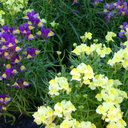A double-network poly(Nɛ-acryloyl L-lysine)/hyaluronic acid hydrogel as a mimic of the breast tumor microenvironment.
Keywords
Abstract
To mimic the structure of breast tumor microenvironment, novel double-network poly(Nɛ-acryloyl L-lysine)/hyaluronic acid (pLysAAm/HA) hydrogels were fabricated by a two-step photo-polymerization process for in vitro three-dimensional (3D) cell culture. The morphology, mechanical properties, swelling and degradation behaviors of pLysAAm/HA hydrogels were investigated. The growth behavior and function of MCF-7 cells cultured on the hydrogels and standard 2D culture plates were compared. The results showed that pLysAAm/HA hydrogels had a highly porous microstructure with a double network and that their mechanical properties, swelling ratio and degradation rate depended on the degree of methacrylation of HA. The results of in vitro studies revealed that the pLysAAm/HA hydrogels could support MCF-7 cell adhesion, promote cell proliferation, and induce the diversification of cell morphologies and overexpression of VEGF, IL-8 and bFGF. The MCF-7 cells cultured on 3D hydrogels showed significantly increased migration and invasion abilities as compared to 2D-cultured cells. Preliminary in vivo results confirmed that the 3D culture of MCF-7 cells resulted in greater tumorigenesis than their 2D culture. These results indicate that the pLysAAm/HA hydrogels can provide a 3D microenvironment for MCF-7 cells that is more representative of the in vivo breast cancer.
UNASSIGNED
Traditional 2D cell cultures cannot ideally represent their in vivo physiological conditions. In this work, we reported a method for preparing double-network poly(Nɛ-acryloyl L-lysine)/hyaluronic acid hydrogel, and demonstrated its suitability for use in mimicing breast tumor microenvironment. Results showed the prepared hydrogels had controllable mechanical properties, swelling ratio and degradation rate. The MCF-7 cells cultured in hydrogels expressed much higher levels of pro-angiogenic growth factors and displayed significantly enhanced migration and invasion abilities. The tumorigenic capability of MCF-7 cells pre-cultured in 3D hydrogels was enhanced significantly. Therefore, the novel hydrogel may provide a more physiologically relevant 3D in vitro model for breast cancer research. To our knowledge, this is the first report assessing a HA-based double-network hydrogel used as a tumor model.


